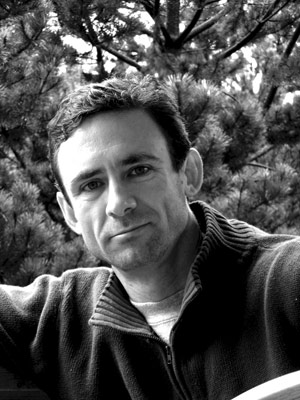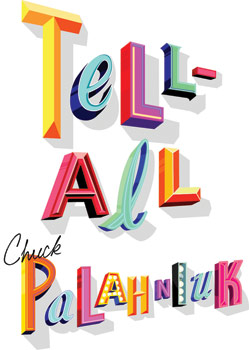Chuck Palahniuk made his name with twisted, minimalist novels like Fight Club and Choke (both of which made it to the big screen, with Fight Club becoming a cult classic).

His newest book, Tell-All is a look into a wicked, viciously funny version of Hollywood during the golden age of film and gossip, complete with rampant name-dropping (every name in the book is in bold), deceit and back-stabbing.
Palahniuk's book tours have also become famous, including, at various times, prosthetic limbs, inflatable penguins and a story so shocking it made audience members faint.
Asheville will get a glimpse of the excitement (and whatever Palahniuk has up his sleeve) on May 8 when he comes to Asheville High School for a reading.
Xpress: What was the genesis for Tell-All?
Palahniuk: There was a movie made from my fourth book — it was called Choke — and I was doing promotion for that movie with Sam Rockwell, who's the primary actor, and Sam was telling me about being in the Jesse James movie with Brad Pitt, and at one point he stopped himself and he said "Listen to me, blah blah blah Brad Pitt, blah blah blah Brad Pitt. It's almost like I have some kind of name-dropping form of Tourette's syndrome."
It was such a funny moment, and such a true thing to say: that name-dropping when you keep hearing it, does sound like Tourette's syndrome. Names, proper nouns, especially celebrity names, become like exclamations or like onomatopoeia, where they really do sound like animal noises, like barking. That was the moment that started the book.
The novel's told from the viewpoint of someone who works for an aging actress, back in the golden age of movies, and is obsessed with preserving her image. She says at one point that "Every movie star is a slave to someone." That's an interesting concept, I was wondering if you could speak a little more about that.
[Laughing] Edward Norton, when Edward signed to do Primal Fear, his first sort of breakout movie, where he played the fake split-personality killer, he signed what they call a "slave contract" where, in order to get this really juicy role, you agree to do two more unspecified pictures in the future at a very, very low wage despite how famous you might become. It was that slave contract that got Edward sued by Paramount and he was forced to come back and make a couple more movies he wasn't very enthusiastic about. But these slave contracts are so ubiquitous, especially in movies.

Some of your work, Fight Club, Snuff, for example, and now Tell-All, can come off as exposés of cultures in our society — celebrity in this case — is that intentional?
Not so much. No, because that would be setting me up as the smart person who really has the authority to stand on the outside and say everyone else is wrong. That's never my intent.
What is your intent?
Number one: To deal with a personal issue in a very metaphorical, disguised way and exhaust all my feelings around that issue. Number two: To create a very dynamic, compelling kind of object that will hold people's attention long enough for them to find some aspect of their lives in that object.
What's the personal issue with Tell-All?
My mother had lung cancer last year and I took care of her for a year and she died. So basically most of the time it was me and her in her house and her sickening and her dying. So, I got a lot of writing done.
You've said you get a lot of your story ideas while you're on tour. How does that process work?
I'm thrown together with a lot of people in a lot of fairly static situations, like sitting in cars or stuck in airports or being aboard airplanes. That lends itself to conversation, and so you find yourself thrown together with so many different people talking about so many different things. Usually I come away from tour with a dozen books I want to write, based on what people have told me.
Looking at the latest tour, there's some fairly major cities on it. Then there's Asheville in the middle. Why Asheville?
Asheville must have done something right. I'm a slave to Random House, and Random House said, "You're going there."
Speaking of the tours, you said at some point that you wanted to inject more excitement and chaos into them. They've involved, in the past, prosthetic body parts and inflatable penguins. What's next and why do you do those type of events at your readings?
This year, like every year, I try to bring something that's specifically for the tour, so that no one is really hearing this story except for the people who bothered to come to tour events. There's an enormously upsetting story, kind of on-par with the "Guts" story that's so infamous.
The one that made people faint.
Exactly. This one won't make them faint, but it's just as strong in a different way. And there's inflatables, and there's contests.
One description of your work that comes up, sometimes as a criticism, is that it's nihilistic. Do you think that's so?
I think it's a really easy tag or label for people to put on something they don't fully understand. I find that if you don't agree with what other people believe about the world, the first thing they do is either call you a fascist or a nihilist. In America they call you a nihilist, in Europe they call you a fascist. That's the fastest way to dismiss you.
Do you usually do most of your writing by yourself or while you're traveling?
Both. I'm pretty much always writing. If I'm not writing, then I'm thinking and wishing I had a pen. But I'm always, always writing.
David Forbes can be reached at dforbes@mountainx.com.
who: Chuck Palahniuk
what: Book tour and reading for Tell-All
where: Asheville High School auditorium, 419 McDowell St.
when: Saturday, May 8 (7 p.m. Tickets are $31.88 and include a signed copy of the book. Get them at Malaprop's Books or call 800-441-9829)



Sigh.
I can’t wait.